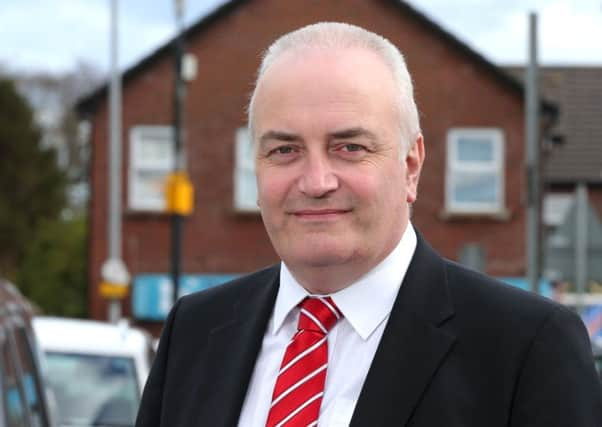Renewable heat scheme branded one of Stormont's worst-ever scandals


Assembly member Daniel McCrossan made the claim as he and fellow members of the Public Accounts Committee (PAC) quizzed officials involved in the administration of the ill-fated Renewable Heat Incentive (RHI) scheme.
A lack of cost controls enabled businesses to claim huge sums of public money for running biomass boilers, with allegations of an “ash for cash” racket that saw some applicants claim vast sums for heating empty buildings.
Advertisement
Hide AdAdvertisement
Hide AdThe Department of Enterprise, Trade and Investment (DETI, now the Department of Economy) designed the RHI scheme but it appointed government utility regulator the Office of Gas and Electricity Markets (Ofgem) to administer it, for a cost of £1.5 million.
Ofgem officials faced over four hours of intense questioning at Parliament Buildings on Wednesday.
“It was very clear the department was asleep at the wheel but I am horrified that you too were asleep at the wheel in relation to this,” SDLP representative Mr McCrossan told the Ofgem witnesses.
“This is public money – we can hardly afford a health service and now we are having to fork out for this. Utterly ridiculous.
Advertisement
Hide AdAdvertisement
Hide Ad“At which point did you realise this was going to blow up in everybody’s faces, that this was going to cost an unprecedented amount of money and is probably one of the biggest scandals that we will face here since the powers were devolved?”
Dr Edmund Ward from Ofgem said risks associated with the lack of a cap were raised in its feasibility study in 2011.
His colleague Chris Poulton acknowledged some faults with the organisation’s handling of the scheme, but stressed the scheme was ultimately shaped by DETI.
“As administrators we don’t set policy,” he said.
The RHI encouraged the installation of costly eco-friendly heating systems by paying a tariff per kilowatt of heat burned over a 20-year period.
Advertisement
Hide AdAdvertisement
Hide AdThousands signed up to the RHI scheme, which started in 2012 and was extended to domestic customers in 2014.
However, unlike in the rest of the UK, in Northern Ireland no cap or payment tier system was placed on the money that could be claimed in proportion to the size of boiler.
In effect, that enabled a business to burn unnecessary fuel just to make money.
It was envisaged the UK Government would fund most of the RHI scheme, but the expenditure commitment in Northern Ireland over the next 20 years is well above a Treasury funding cap, meaning Stormont will need to find hundreds of millions to make up the shortfall.
Advertisement
Hide AdAdvertisement
Hide AdThe Ofgem officials said there were three cases of suspected fraud being investigated.
According to whistleblower claims, a farmer is allegedly in line to receive £1 million over the next 20 years for heating an empty shed under the scheme.
Meanwhile large factories in Northern Ireland are also allegedly on course to pocket £1.5 million over two decades for running incentivised biomass boilers all year round in premises that previously were not heated.
Overall, more than £1 billion of public money will be paid to Northern Ireland-based businesses by 2036 after they installed new appliances under the RHI scheme, which is now closed.
Advertisement
Hide AdAdvertisement
Hide AdDUP committee member Trevor Clarke told the Ofgem officials that noting issues in a feasibility study was not the same as directly highlighting risks to DETI.
“It wasn’t flagged up,” he said.
Mr Poulton said specific concerns were raised with DETI officials in April 2014.
Mr Clarke pointed to allegations that some people had used boilers to dry wood, then burned that wood in the boilers to dry more wood – in a cycle that went on and on just to claim money.
“Anything goes, you can do what you want because you can’t be expelled from the scheme,” he said.
Advertisement
Hide AdAdvertisement
Hide AdOfgem said 59 people had applications turned down or discontinued for non-compliance out of 2,128.
Sinn Fein’s Declan Kearney said the RHI had created a situation of “quite catastrophic proportions”.
Committee chair Robin Swann was scathing about the answers provided by the Ofgem officials.
“You are raising more questions for us at this stage than you are actually answering,” said the Ulster Unionist member.
Advertisement
Hide AdAdvertisement
Hide Ad“I thought by bringing Ofgem here today we were going to bring some light and clarity into this process and into this scheme.
“You said you rehearsed for this – I would have hated to see you here if you hadn’t.”
Alliance member Trevor Lunn said the scheme was so badly designed it had enabled “legalised fraud”.
“You can actually defraud the system by not telling any lies on the form, it’s that bad,” he said.
“The whole thing seems so loose and badly managed – it’s just wide open.”